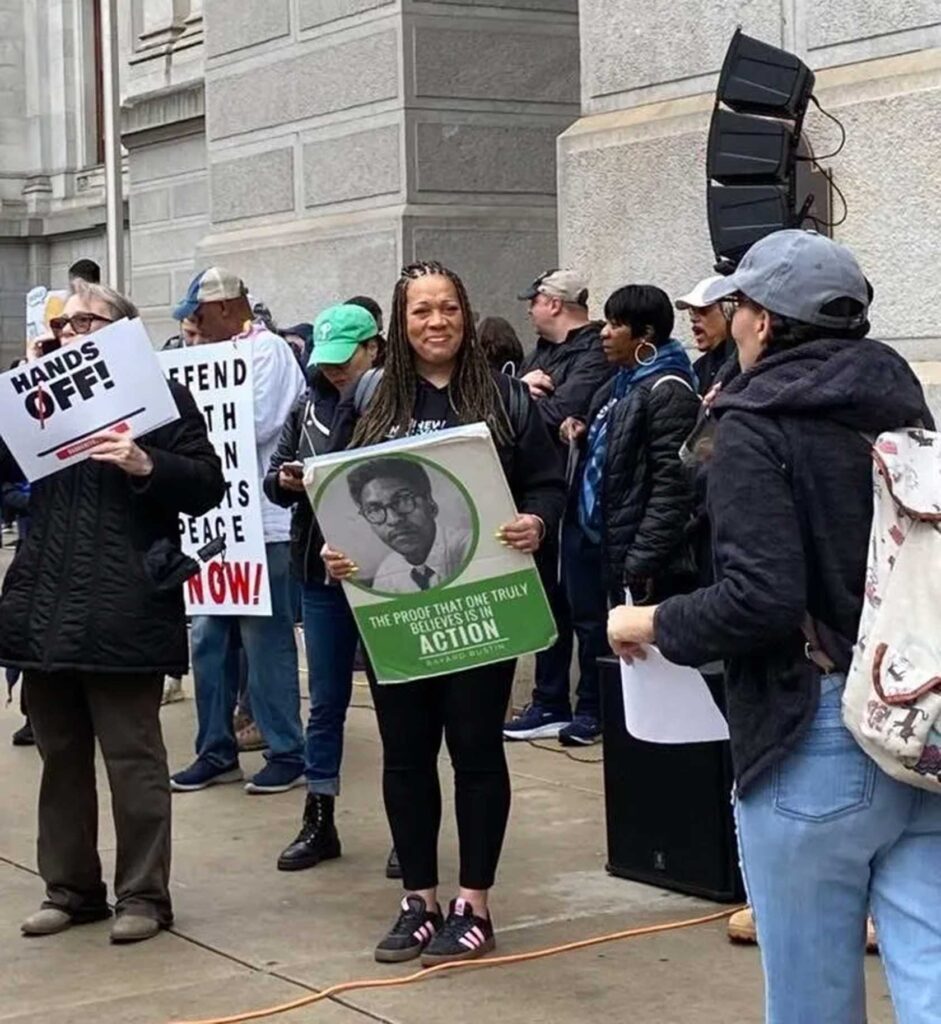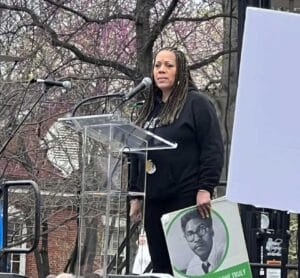
From the podium at Philadelphia’s Independence Mall, Kadida Kenner, executive director of the New Pennsylvania Project, scanned the vast human landscape at the April 5 “Hands Off!” protest. Among the estimated 30,000 assembled, she made a stark observation: Black protesters were missing.
National organizers claim approximately 1,400 rallies drew some 4 million, reportedly the largest mass protest in the nation’s history. In big cities, small towns and overseas, protesters demonstrated their outrage against the Donald Trump/Elon Musk policies.
From anecdotal and visual assessments, the constituency that represented the largest opposition to the Trump presidency did not show up — especially the ranks of Black women, who gave 92% of their votes to Kamala Harris.
Making a collective statement by their absence, social media memes depicted Black folks stepping to line dances and waving hand fans as an answer to multiracial protests, or what Kenner, a speaker at the Philly rally, describes as “taking a break and leaning into our joy.”

Organizer Kadida Kenner is the executive director of the New
Pennsylvania Project. The organization is a voting rights organization with a year-round primary focus on voter registration, civic education and mobilization. PHOTO: COURTESY OF KADIDA KENNER
Salandra Benton, executive director of the Florida Coalition on Black Civic Participation, stayed home. “We’ve been working first, second, and third shift. It’s time for someone else to pick up the slack. We’re weary, and a piece of our spirit was robbed from us in the last election. For Black women, this is a season of reflection and self-care.”
When America gets a cold, Black people get pneumonia
Benton, mindful of that metaphor, insists everyone, save for billionaires, is being harmed by the Trump administration’s policies. “Maybe the organizers of these mass rallies should focus on working-class whites who supported Trump,” said Benton, who is also convener of the Florida Black Women’s Roundtable.
Benton and others interviewed on this subject underscored that Black organizing remains pivotal. But multiracial public demonstrations are a low priority compared to beating back the threats to 60 years of racial progress.
Longtime activist and writer Bill Fletcher acknowledges the state of despair but also laments the lack of a focused Black movement. “There are disparate actions and organizations with various levels of effectiveness, but no cohesion,” said Fletcher. “We can’t discount the exaggerated impact of social media and well-funded right-wing disinformation.”
The fix for Fletcher is sustained campaigns that defend and safeguard against attacks by the Trump administration to unleash denaturalization policies on American citizens, dismantle the Smithsonian National Museum of African American History and Culture, and retrench the 14th Amendment, which guarantees equal protection.
“We are in a war, and the other side seeks to annihilate us. We can’t go it alone,” said Fletcher, who recommends strategies to fight back and solidify coalitions with Black organizations and progressive whites.
While multiracial organizing is an important weapon in the toolkit of social change, there must be reciprocity in the give and take, says Helen Butler, executive director of the Georgia Coalition for the People’s Agenda.
“We have to forge partnerships with people who embrace our issues as much as they expect us to embrace theirs,” said Butler, who led voter mobilization campaigns that elected Georgia’s first Black,Raphael Wornock, and first Jew, Jon Ossoff, to the U.S. Senate in 2020. “Strong multiracial protests emerged around the murder of George Floyd, but today, we get little support outside of our community fighting ongoing police abuse.”
Multiracial protests are important public statements, says Kenner of Philadelphia, who describes such activities as “human yard signs.”
“Demonstrations are events, not movements,” Kenner said. “They proclaim to the world your beliefs, joining with people who share your values and say we are not alone.” Recalling Mississippi Civil Rights activist Fannie Lou Hamer: Nobody’s free until everybody’s free, Kenner stressed, “If we’re erased, the aim is to also deny the generational horrors that have been visited upon Black people. But our oppression impacts the nation.”
From the Middle Passage forward, Black people have endured a multicentury fight for democracy, punctuated with violence, victories and progress. But movements and activism have never wavered. “Historically, we’ve been fighting a civil war in America for a long time. The wealthiest among us is screwing all of us,” said Erica Smiley, executive director of Jobs With Justice, an organization dedicated to workers’ rights and economic empowerment.
“I don’t think Black folks have been out of the mix in power-building,” Smiley continued. She notes the call to boycott Target for abandoning its diversity, equity and inclusion policies was issued by Black leadership. Though Target won’t comment, the boycott has had a marked impact on the store’s foot traffic and bottom line, she conjectures.
“Millions of Black folks haven’t been to Target for weeks. Not showing up there is far more powerful than showing up for a protest. Showing up for a workers’ strike makes a greater impact than missing a public rally.” Smiley makes a distinction between public activism and protests, and power-building and winning.
Through a lens of race and economic power, she explains that Jobs With Justice is part of the labor movement, as opposed to the institutionalized union movement. But organized labor and the labor movement have a symbiotic relationship that is essential for the success of all working people.
“Anyone who doesn’t understand that Black history is also the history of Black workers, beginning with forced labor and enslavement, misses the point (about) the importance and power of the labor movement,” Smiley maintains. “Industries, companies and profiteers know the power of the labor movement across race and gender. They need us more than we need them.”
Gwen McKinney is the campaign director and creator of Unerased| Black Women Speak.






